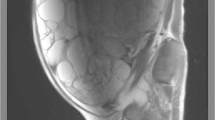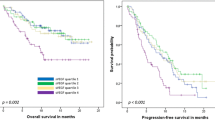Abstract.
The potential role of angiogenesis stimulators in the pathogenesis of different tumor entities has been confirmed in several studies. We measured the serum levels of basic fibroblast growth factor (bFGF), vascular endothelial growth factor (VEGF) and platelet derived growth factor (PDGF) in 51 patients with testicular germ cell tumors and in 39 healthy volunteers. Serum concentrations of bFGF, VEGF and PDGF-AB were determined by enzyme-linked immunosorbent assay. The median serum bFGF level for tumor patients was 3.46 pg/ml (range 0–61.6) compared to 0.7 pg/ml (0–11) in the control group (P<0.01). In patients with metastatic disease, the median serum bFGF level was 10.3 pg/ml (0–61.6) in contrast to 2.8 pg/ml (0–50) in patients with localized disease (P<0.01). The median serum VEGF and PDGF levels were 270 pg/ml (0–1,903) and 37,837 pg/ml (9,075–108,800), respectively, for tumor patients and 200 pg/ml (44–585) and 23,000 pg/ml (4,250–70,650) in the control group (P<0.05). Our data suggest that angiogenesis, as reflected by serum concentrations of bFGF, VEGF and PDGF, plays a functional role in the growth and progression of testicular germ cell tumors.
Similar content being viewed by others
Author information
Authors and Affiliations
Additional information
Electronic Publication
Rights and permissions
About this article
Cite this article
Bentas, W., Beecken, WD., Glienke, W. et al. Serum levels of basic fibroblast growth factor reflect disseminated disease in patients with testicular germ cell tumors. Urol Res 30, 390–393 (2003). https://doi.org/10.1007/s00240-002-0288-8
Received:
Issue Date:
DOI: https://doi.org/10.1007/s00240-002-0288-8




